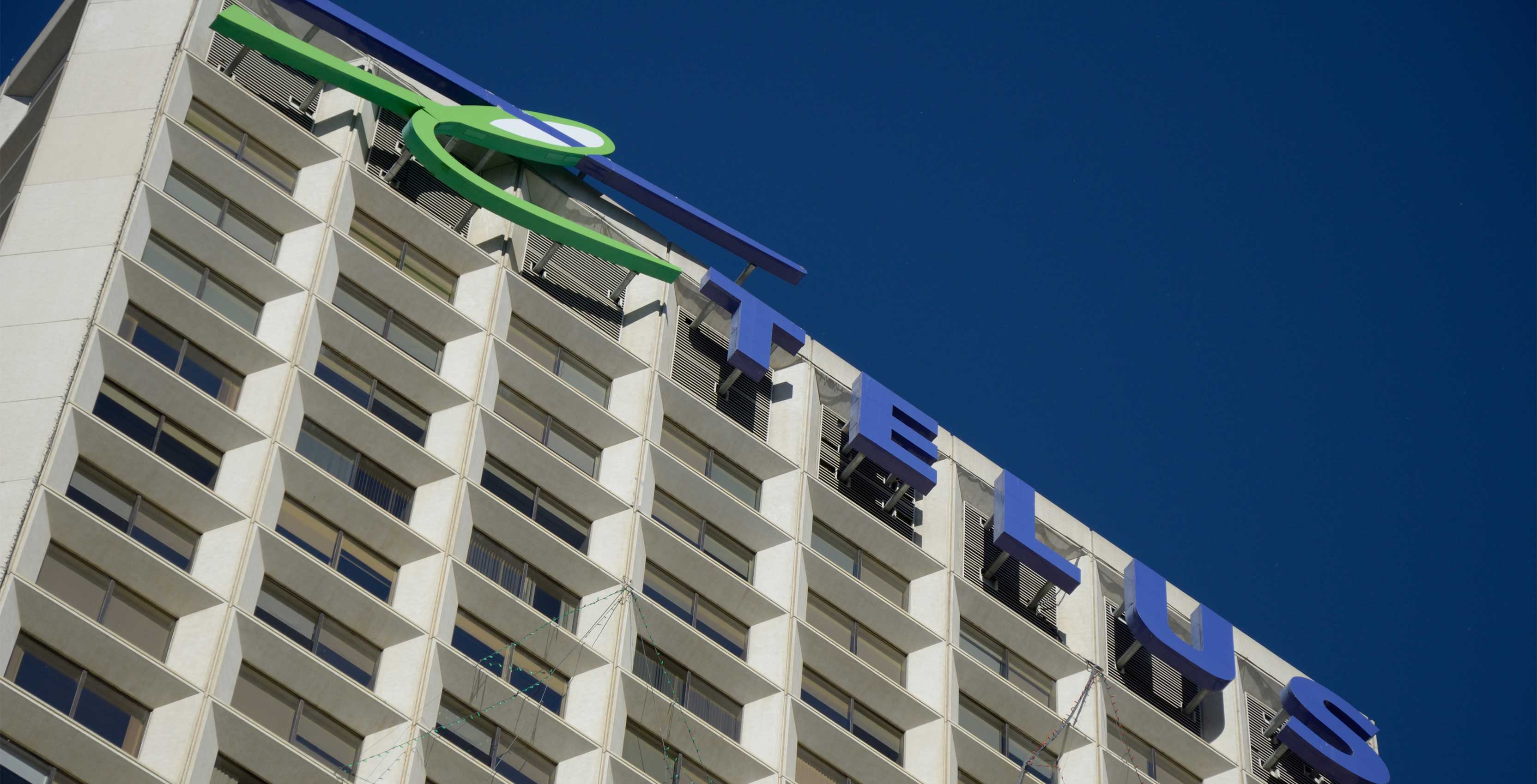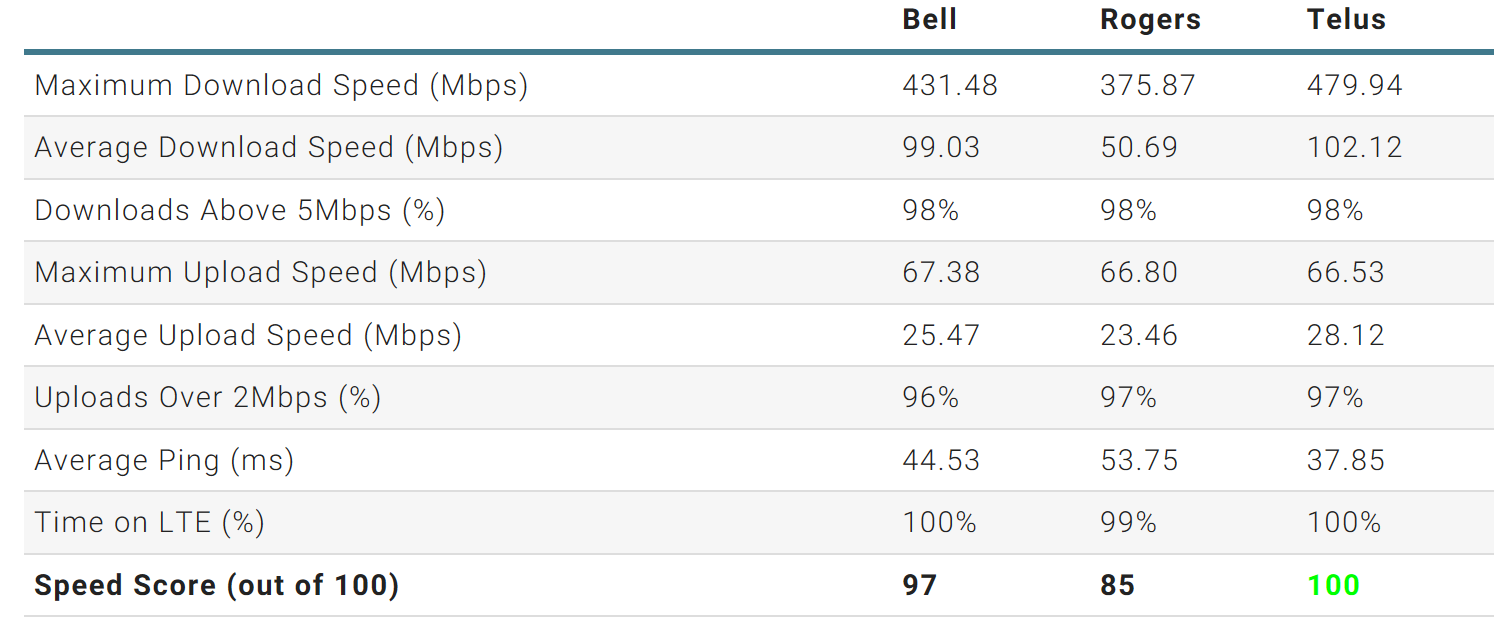
Telus offers Canadians the fastest wireless speeds, according to the results of PCMag‘s annual speed test.
This marks the first time in five years that Telus, Canada’s third largest carrier, has won PCMag’s Canadian speed test. The publication notes, however, that it was a tight race between Telus and Bell — which have an infrastructure sharing agreement — in terms of overall performance.
Additionally, this speed test marks the first time PCMag has visited all 10 provinces to complete the test, with Newfoundland also featured in the proceedings this time around.
This speed test marks the first time PCMag has visited all 10 provinces to complete the test.
Telus scored an impressive average nationwide download speed of 102.12Mbps, while Bell followed with 99.03Mbps and Rogers lagged behind at 50.69Mbps. Upload speeds were closer between all three carriers. Telus came in at 66.53Mbps, Bell had 67.38Mbps and Rogers got 66.80Mbps.
As for latency, Telus featured a desirably low ping rate of 37.85 milliseconds, while Bell had 44.53ms and Rogers 53.75ms.
For those unfamiliar with the concept, the measured latency of a network shows how fast data can be fetched from the server with which the user is connecting.
Percentage of time on an LTE network was impressive for all three major carriers, but particularly Bell and Telus at 100 percent, while Rogers closed in at 99 percent.

While it used averaged scores to judge the different networks, the publication says it found significant differences depending on geographic location in this vast nation. Telus, PCMag‘s Sascha Segan says, performs well in urban hubs, Bell does well in mid-size Ontario communities and Atlantic Canada and regional carrier Videotron dominates in small Quebec cities, as it did last year.
Segan also notes that Telus’ newfound position at the top can be attributed to a confluence of factors. It gained access to Bell’s Band 7 spectrum in 2015 and kept pace with its competitor’s new carrier aggregation technology — in fact, Telus argues it came out ahead of Bell with its Quad Band LTE roll-out. But it also, says Segan, appears to have optimized its core network over the past year, particularly in cities.
“Over the last 10 years, TELUS has invested more than $25 billion to offer Canadians an exceptional, world-class networks network experience,” said Eros Spadotto, Telus executive vice-president of technology strategy, in a prepared statement. “As a result of our commitment to our customers, we’ve built a network that is not only reliable, but is also now recognized as the fastest in Canada…”
One of the most intriguing elements of the speed test, however, are the margins between Telus and Bell, and their other Big Three competitor, Rogers. The nation’s largest carrier by subscriber count is often lagging the other two carriers’ speeds by half. Further, that’s taking a toll on Videotron, which shares the Rogers network.
The nation’s largest carrier by subscriber count is often lagging the other two carriers’ speeds by half.
It should be noted, however, that one of the reasons the speeds are impressively high is that the network was tested on gigabit LTE-capable Samsung Galaxy S8 devices, which support four-carrier aggregation, 256-QAM encoding and 4×4 MIMO. The only other devices currently able to produce similar speeds are the HTC U11, LG V30, Samsung Galaxy Note 8 and Sony Xperia XZ1.
Segan also made special note of Freedom Mobile, the “potential game changer” in Canadian wireless. In Toronto, some southern Ontario cities and Edmonton, the carrier provides speeds akin to the Rogers network, though its reliability is still in question. Freedom’s network in Toronto is 10 percent less reliable than Bell’s, and in Hamilton, it was 30 percent less reliable.
Freedom Mobile is expected by some, including IDC Canada analyst Lawrence Surtees, to follow in the footsteps of American carrier T-Mobile and eventually take on the Big Three with unlimited data offers that are difficult to resist.
Segan says in this year’s speed test report that his results show “Canada’s networks can handle [unlimited data]” — aiming at an argument frequently made by Bell, Telus and Rogers when asked about the prospect of unlimited data.
“We respectfully disagree with the carriers that they can’t offer bigger, cheaper plans to Canadian consumers,” writes Segan.
“Now, Canada only needs an ‘un-carrier’ to push things forward. Perhaps Freedom is up to the task.”
In terms of brief breakdowns per city and province:
- Alberta: Bell won Calgary while Telus got Edmonton.
- Manitoba: Telus took Winnipeg.
- British Columbia: Telus snagged both Vancouver and Victoria.
- New Brunswick: Bell got Moncton and Telus took Fredericton.
- Newfoundland: Bell won St. John’s.
- Nova Scotia: Bell swept most locations, including Halifax.
- Ontario: Telus took Ottawa and Toronto.
- Prince Edward Island: Bell and Telus tied.
- Quebec: Telus took both Montreal and Quebec City.
- Saskatchewan: Regina went to Rogers — though it should be noted that regional carrier SaskTel wasn’t tested.
As for methodology, PCMag used custom software from Ookla, which is owned by PCMag‘s parent company. The software runs every 90 seconds, ending up with about 36,000 test runs, taken while PCMag‘s testers drove throughout Canada and stopped in various cities and towns.
The publication says it gave all carriers the opportunity to participate, with SaskTel being the only notable carrier to abstain.
Last year, Bell received the title of Canada’s fastest mobile network, as it did the year previous. In 2014, Bell and Rogers tied for speed.
For further details, check out the full report here.
Source: PCMag
MobileSyrup may earn a commission from purchases made via our links, which helps fund the journalism we provide free on our website. These links do not influence our editorial content. Support us here.


